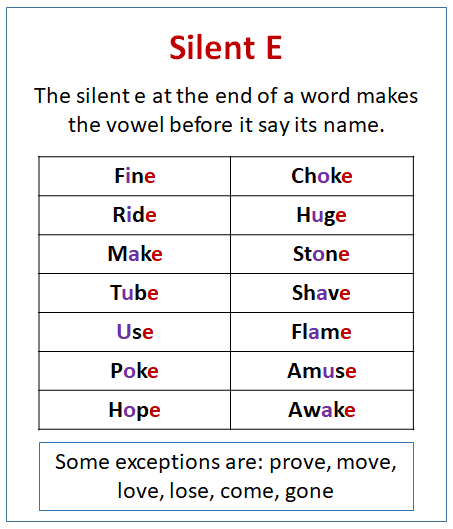The Silent E
Examples, videos, and songs to help First Grade kids learn how to pronounce words with the silent E.
The silent E is a powerful letter that changes the way we read and pronounce words. It is often found at the end of a word, where it is silent but influences the preceding vowel sound.
What Does Silent E Do?
-
Makes the Vowel Long:
The silent E changes a short vowel sound into a long vowel sound (where the vowel “says its name”).
cap → cape (short “a” becomes long “a”)
hop → hope (short “o” becomes long “o”)
rid → ride (short “i” becomes long “i”) -
Stops Words from Ending in V:
English words don’t end with the letter V, so the silent E is added.
For example, give, live
List of words where the E is not pronounced.
The following diagram shows a list of words that has the silent E. Scroll down the page for more examples and explanations using the silent E.

-
Silent E Exceptions
There are some exceptions where the silent E doesn’t follow the typical rule:
For example: love, have, give: The vowel sound doesn’t change, but the E is still silent.
For example: done, come: These have irregular vowel sounds. -
Fun Fact:
The silent E is sometimes called the “bossy E” or “magic E” because it changes the vowel sound!
Here are some free printable worksheets to help you practice using the silent E.
| Printable Worksheets (Silent E) | |
|---|---|
|
Long A Silent E |
Long I Silent E |
|
Long O Silent E |
Long U Silent E |
Here are some videos that will help you learn the silent E.
Silent E
Phonics Song for Kids
The silent e at the end of a word makes the vowel before it say the long vowel sound while the e remains silent.
The Silent E Song for kids
The Magic E Song
| Silent Letters | ||
|---|---|---|
| Silent B | Silent C | Silent D |
| Silent E | Silent G | Silent GH |
| Silent H | Silent K | Silent L |
| Silent T | Silent W | |
Learn the Sounds of the Letters
Learning Short Vowels
| Short Vowels | ||
|---|---|---|
| Short A | Short E | Short I |
| Short O | Short U | Short Vowels |
Learning Long Vowels
| Long Vowels | ||
|---|---|---|
| Long A | Long E | Long I |
| Long O | Long U | Y (vowel) |
| Long Vowels | Short, Long Vowels | |
Compare Short & Long Vowels
| Short & Long Vowels | ||
|---|---|---|
| Short & Long A | Short & Long E | Short & Long I |
| Short & Long O | Short & Long U | Short I & Long E |
Learning Consonants
Try out our new and fun Fraction Concoction Game.
Add and subtract fractions to make exciting fraction concoctions following a recipe. There are four levels of difficulty: Easy, medium, hard and insane. Practice the basics of fraction addition and subtraction or challenge yourself with the insane level.

We welcome your feedback, comments and questions about this site or page. Please submit your feedback or enquiries via our Feedback page.